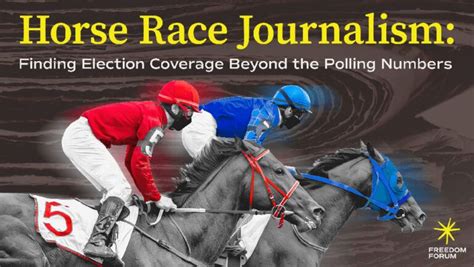Introduction

In the realm of political reporting, horse race journalism has become a prevalent practice, particularly in the context of Advanced Placement (AP) Government courses. This form of journalism focuses on the competitive aspects of elections, with an emphasis on the candidates’ standings and the projected outcomes. While horse race journalism can provide certain insights into the electoral process, it also presents several limitations and potential drawbacks. This article endeavors to shed light on the multifaceted nature of horse race journalism in AP Gov, exploring its advantages, disadvantages, and implications for political discourse.
The Allure of Horse Race Journalism
Horse race journalism holds a particular appeal for several reasons:
- Engaging and Accessible: It presents election news in a captivating and easy-to-understand manner, making it appealing to a wider audience.
- Provides Early Insights: It offers early indications of candidate popularity and electoral trends, satisfying the public’s curiosity about potential outcomes.
- Stimulates Political Interest: By highlighting the competitive nature of elections, horse race journalism can ignite interest in politics among students and the general public.
Pain Points and Drawbacks of Horse Race Journalism
Despite its appeal, horse race journalism has several inherent pain points and drawbacks:
- Oversimplifies Complexity: It tends to reduce complex political issues to a simplistic “who’s ahead” narrative, neglecting the underlying policy debates and ideological differences.
- Focuses on Personalities: Horse race journalism often emphasizes candidate personalities and ratings, diverting attention from substantive policy discussions.
- Creates a False Sense of Certainty: By projecting potential outcomes, it can create a false impression of inevitability, discouraging voters from actively participating in the electoral process.
Implications for Political Discourse
The prevalence of horse race journalism in AP Gov can have subtle but significant implications for political discourse:
- Erosion of Substance: Excessive focus on horse race journalism can marginalize substantive policy debates, resulting in a diminished understanding of the issues at stake.
- Inhibits Voter Turnout: When elections are portrayed as predetermined, it can discourage voters from participating, undermining the democratic process.
- Polarization of Perspectives: Horse race journalism often amplifies political divisions by presenting candidates in an adversarial light, contributing to polarization and hindering constructive dialogue.
Strategies to Mitigate the Negative Effects
To minimize the negative effects of horse race journalism in AP Gov, several effective strategies can be employed:
- Emphasize Policy Analysis: Encourage students to go beyond horse race reporting and delve into the underlying policy platforms of candidates.
- Foster Critical Thinking: Engage students in critical thinking exercises that challenge the assumptions and limitations of horse race journalism.
- Promote Responsible Reporting: Encourage journalists to avoid overly simplistic and sensationalized reporting, and to focus on providing comprehensive and balanced coverage.
Why it Matters
Addressing the limitations of horse race journalism is essential for fostering informed and engaged political discourse. By minimizing its negative effects and promoting a more nuanced approach to election reporting, we can:
- Enhance Political Literacy: Improve students’ understanding of the complexities of the electoral process and the issues that shape public policy.
- Strengthen Civic Participation: Encourage active participation in elections by dispelling the perception of inevitability and highlighting the importance of every vote.
- Promote Healthy Dialogue: Foster constructive political conversations that focus on policy substance rather than personality attacks.
Conclusion
Horse race journalism in AP Gov can be a double-edged sword. While it offers certain advantages, it also presents potential drawbacks that can undermine the quality of political discourse. By recognizing its limitations and employing effective mitigation strategies, we can harness the strengths of horse race journalism while minimizing its negative effects. Ultimately, the goal is to foster a more informed and engaged citizenry capable of making thoughtful decisions about their political future.












